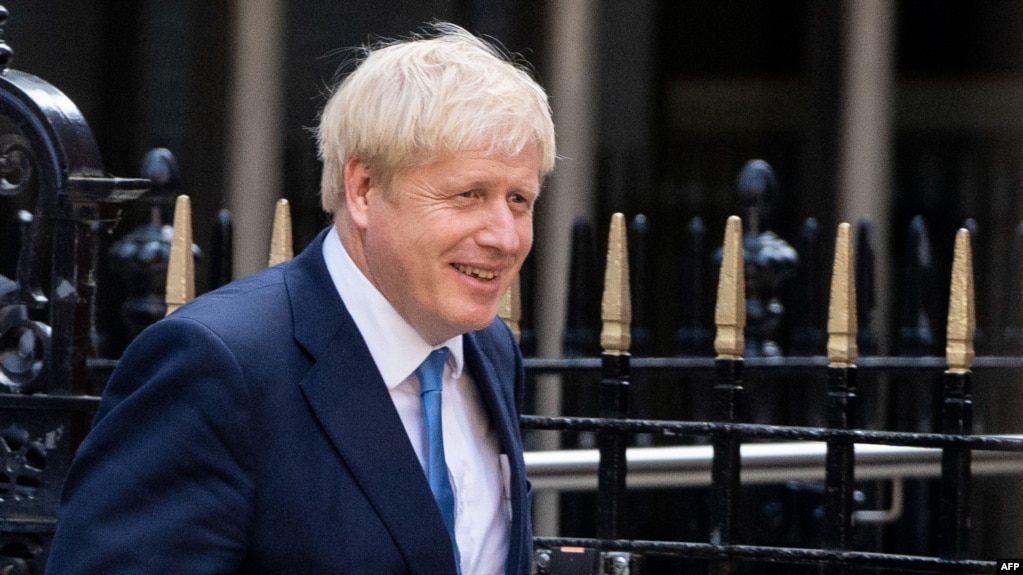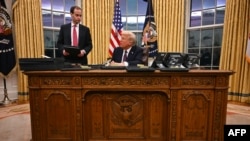ທ່ານບໍຣິສ ຈອນສັນ ມີກຳນົດທີ່ຈະເປັນນາຍົກລັດຖະມົນຕີຄົນໃໝ່ ຂອງອັງກິດໃນວັນ
ພຸດມື້ນີ້ ໃນຂະນະທີ່ ທ່ານນາງ Theresa May ໄດ້ລົງຈາກຕຳແໜ່ງຢ່າງເປັນທາງການ
ທີ່ທ່ານນາງໄດ້ກຳໜ້າທີ່ ມາເປັນເວລາສາມປີ.
ຄວາມໄຝ່ຝັນຂອງອະດີດນັກຂ່າວ ແລະຄັ້ງນຶ່ງເຄີຍເປັນເຈົ້າຄອງນະຄອນຫຼວງລອນ
ດອນ ໄດ້ມີມາຕະຫຼອດຊີວິດການເມືອງຂອງທ່ານ ທີ່ຈະເອົາໜ້າທີ່ສູງສຸດ ແຕ່ວ່າທ່ານ
ຈະບໍ່ມີຄວາມລາບລື້ນກັບນ້ຳເຜີ້ງພະຈັນແລະຕຳແໜ່ງນາຍົກລັດຖະມົນຕີຂອງທ່ານ
ແມ່ນຢູ່ກັບຄົມມີດ. ຖ້າຫາກທ່ານເຮັດສິ່ງທີ່ຜິດພາດ ທ່ານອາດຈຈະເອົາຊະນະ Lord Rockingham ຜູ້ທີ່ໄດ້ໃຊ້ເວລາພຽງແຕ່ 96 ມື້ເທົ່ານັ້ນຮັບຕຳແໜ່ງຢູ່ຖະໜົນ Downing
ໃນປີ 1782 ໃນຖານະນາຍົກລັດຖະມົນຕີອັງກິດທີ່ກຳຕຳແໜ່ງສັ້ນທີ່ສຸດ.
ບັນດາພວກຄັດຄ້ານພາຍໃນພັກຂອງທ່ານ ທີ່ນຳພາໂດຍລັດຖະມົນຕີການເງິນທີ່ພົ້ນ
ຈາກໜ້າທີ່ໄປແລ້ວນັ້ນ ຄື ທ່ານ Philip Hammond ໄດ້ສະແດງໃຫ້ເຫັນຢ່າງຈະແຈ້ງ
ວ່າ ຖ້າຫາກທ່ານພະຍາຍາມທີ່ຈະເອົາອັງກິດອອກຈາກສະຫະພາບຢູໂຣບ ໂດຍປາດ
ສະຈາກຂໍ້ຕົກລົງ ທີ່ໄດ້ເຫັນພ້ອມຈາກບຣັສເຊີລສ໌ ເຂົາເຈົ້າຈະລົງຄະແນນສຽງກັບບັນ
ດາພັກຝ່າຍຄ້ານ ເພື່ອທັບມ້າງລັດຖະບານທີ່ຈະທຳລາຍ ຕໍ່ອັນທີ່ຮ້ອງວ່າ “hard Brexit.”
ນັ້ນຈະເຮັດໃຫ້ມີການເລືອກຕັ້ງກ່ອນກຳນົດທີ່ບັນດາສະມາຊິກພັກນິຍົມແນວທາງເດີມ
ທີ່ມີທ່າທາງວ່າອາດຈະບໍ່ໄດ້ຊະນະ.
ການຊີມລົດຊາດຂອງສິ່ງທີ່ຈະເກີດຂຶ້ນຕໍ່ຄຳໜັ້ນສັນຍາຂອງທ່ານ ທີ່ຈະນຳພາອັງກິດ
ອອກຈາກສະຫະພາບຢູໂຣບໃນວັນທີ 31 ຕຸລານັ້ນ “ເຮັດ ຫຼື ຕາຍ” ໄດ້ມີການປະກາດ
ໃນວັນຈັນທີ່ຜ່ານມານຶ່ງມື້ກ່ອນວັນໄຊຊະນະຂອງທ່ານໃນການແຂ່ງຂັນ ທີ່ຈະເປັນນຳ
ພາ ພັກນິຍົມແນວທາງເດີມ. ທ່ານ Alan Duncan ໄດ້ລາອອກ ຈາກໜ້າທີ່ລັດຖະມົນ
ຕີກະຊວງຕ່າງປະເທດທີ່ຈະເລີ້ມການດຳເນີນຄວາມ ພະຍາຍາມເພື່ອບັງຄັບ ທ່ານ
Johnson ປະເຊີນໜ້າກັບການລົງມະຕິບໍ່ໄວ້ວາງ ໃຈໃນສະພາຕ່ຳ ແມ່ນກະທັງກ່ອນທີ່
ທ່ານຖືກເຊີນໂດຍພະລາຊີນີ ໃຫ້ເຂົ້າໄປຮັບ ຕຳແໜ່ງເປັນນາຍົກລັດຖະມົນຕີ ທີ່ຖະໜົນ Downing.
ປະທານສາພາຕ່ຳ ໄດ້ຂັດຂວາງຄວາມພະຍາຍາມ ຂອງທ່ານ Duncan.
ບໍ່ພຽງເທົ່າໃດຄົນຂອງຜູ້ສະໜັບສະໜູນ ບັນດາສະມາຊິກສະພານິຍົມແນວທາງເດີມ ທີ່
ໃຫ້ການສະໜັບສະໜຸນ ຕໍ່ສະຫະພາບຢູໂຣບ ຈະສາມາດເຮັດໃຫ້ທ່ານ Johnson ຜິດ
ຫວັງ. ຫົກທ່ານພວມຢູ່ໃນການສົນທະນາກັບພັກເສລີປະຊາທິປະໄຕທີ່ຈະໂຕນພັກອີງ
ຕາມແຫຼ່ງຂ່າວພາຍໃນພັກ. ມີລັດຖະມົນຕີເຖິງສິບກວ່າຄົນ ສອງຄົນ ຄາດວ່າຈະລາ
ອອກຈາກຄະນະລັດຖະບານ ແມ່ນກະທັງກ່ອນທີ່ທ່ານ Johnson ຈະມາເປັນນາຍົກ
ລັດຖະມົນຕີ ເຖິງແມ່ນວ່າບັນດາຜູ້ຈົງຮັກພັກດີກ່າວວ່າ ເຂົາເຈົ້າພຽງແຕ່ລົ້ມໃສ່ດາບ
ຂອງເຂົາເຈົ້າເອງ ທີ່ປະຕິເສດໂອກາດຕໍ່ ທ່ານ Johnson ທີ່ຈະປົດເຂົາເຈົ້າອອກ.
ບັນດາສະມາຊິກພັກນິຍົມແນວທາງເດີມ ປົກຄອງປະເທດໃນນາມລັດຖະບານສຽງ
ສ່ວນນ້ອຍ ແລະກາງຕໍ່ພັກສະຫະພັນໄອຣ໌ແລນເໜືອ ເພື່ອໃຫ້ເຂົາເຈົ້າກຳສຽງສ່ວນ
ຫຼາຍ ພຽງແຕ່ສອງສຽງຢູ່ໃນສະພາຕ່ຳ. ນັ້ນອາດຈະຫຼຸດລົງມາເຫຼືອພຽງແຕ່ນຶ່ງສຽງຖ້າ
ຫາກສະມາຊິກສະພາພັກນິຍົມແນວທາງເດີມ ຫາກພົບເຫັນວ່າມີຄວາມຜິດໃນການ
ລວນລາມທາງເພດ ໃນການດຳເນີນຄະດີທີ່ຈະມີຂຶ້ນໃນໄວໆນີ້.
Boris Johnson is set to become Britain's new prime minister Wednesday as Theresa May officially resigns from the post she held for three years.
The ambitious former journalist and onetime London mayor has hungered his entire political life for the top job, but he won't enjoy a honeymoon and his premiership is already balanced on a knife edge. If he gets things wrong he could beat Lord Rockingham, who lasted just 96 days at Downing Street in 1782, to emerge as Britain's shortest-lived prime minister.
Rebels in his party, led by the outgoing chancellor of the exchequer, Philip Hammond, are making it clear that if he tries to take Britain out of the European Union without a deal having been agreed to with Brussels, they will vote with opposition parties to bring down the government to sabotage a so-called "hard Brexit." That would trigger a snap election the Conservatives would be unlikely to win.
The taste of things to come on his pledge to lead Britain out of the EU on October 31 "do or die" was delivered Monday on the eve of his victory in the race to lead the Conservative Party. Alan Duncan quit as a foreign office minister to launch an attempt to force Johnson to face a vote of confidence in the House of Commons even before being invited by the queen to enter Downing Street as prime minister.
The Speaker of the House blocked Duncan's effort.
Limited challengers
Only a handful of pro-EU Conservative lawmakers would be able to upset Johnson. Half-a-dozen have been in talks with Liberal Democrats to defect, according to party insiders. Up to a dozen ministers are expected to quit the cabinet before Johnson even becomes prime minister — although his loyalists say they are only falling on their swords to deny Johnson the opportunity to fire them.
The Conservatives are ruling as a minority government and are dependent on a quirky and easily-offended Northern Ireland Unionist party to give them a working majority of just two in the House of Commons. That could drop to just one, if a Conservative lawmaker is found guilty of committing sexual offenses in an upcoming trial.
With the opposition factions, aside from Northern Ireland's Democratic Unionist Party, opposed to Brexit, Johnson faces exactly the same parliamentary dilemma that undid May's leadership, a deadlocked parliament.
May herself warned recently that her successor will face the same hard parliamentary arithmetic she did. But some argue he will face even tougher mathematics. She was opposed by hardline Brexiters in her party when trying to get the withdrawal agreement negotiated with the EU through the House of Commons. Johnson, the face of Brexit, has even less room for maneuvering — he has to deliver for his fellow Brexiters at the same time as finding a way to woo or neutralize pro-EU Conservative rebels, say analysts, and to do this with a wafer-thin and diminishing majority.
The ever-upbeat Johnson appeared undaunted Tuesday in his speech marking the conclusion to a month-long leadership campaign in which both he and rival Jeremy Hunt, the current foreign secretary, criss-crossed Britain in their bid to win the support of Conservative members in a series of hustings as mail-balloting was underway. In the ballot, Johnson won 92,153 votes (66 percent) and Hunt won 46,656 votes (34 percent).
Johnson said it was an "extraordinary honor and privilege" to be elected leader, and he pledged to "energize the country."
"The campaign is over and the work begins," he added. In his trademark optimistic style Monday, Johnson promised to invigorate the country and help Britain to rediscover its "sense of mission." Throughout his leadership campaign he attacked "pessimists" talking Britain down and took aim at what he said was a sense of defeatism.
Brexit hurdle
But cheery rhetoric won't be enough to convince his party rebels — nor EU leaders and their negotiators. In the last few days, EU leaders have warned that they will not roll over to accommodate Johnson. They insist the withdrawal agreement they negotiated with Theresa May and which parliament has declined to endorse three times remains their final word.
"If the approach of the new prime minister is that they're going to tear up the withdrawal agreement, then I think we're in trouble," warned Ireland's foreign minister, Simon Coveney, just hours before Johnson celebrated his win. EU leaders opened back-channels with Johnson last week.
Johnson's allies argue that he is inventive and that if anyone can find a way through the Brexit mess, he is the politician to do so. Conservative lawmaker Jacob Rees-Mogg, a hardline Brexiter, welcomed Johnson's victory Tuesday saying it was a "terrific result" and presented Britain with a "great opportunity" to "make Brexit a success."
Johnson's foes acknowledge his star quality and say that he might light up a room, attract crowds and possesses a startling ability to recover from frequent gaffes and blunders, but he's too tumultuous to occupy Downing Street — especially at a time Britain is facing its thorniest and potentially biggest policy challenge since the 1954 Suez crisis, which risked Britain's important ties with the U.S.
Time will tell who's right. That is if he gets time.
Johnson's other over-arching challenge is to overcome claims that he will be morally and politically an "illegitimate prime minister." He will be the first prime minister to enter Downing Street to head a minority government on the basis of just an internal party vote.
Daunting tasks
Britain's main opposition party, Labor, has targeted his legitimacy. Its leader, Jeremy Corbyn, tweeted Tuesday: "Boris Johnson has won the support of fewer than 100,000 unrepresentative Conservative party members by promising tax cuts for the richest, presenting himself as the bankers' friend, and pushing for a damaging No Deal Brexit. But he hasn't won the support of our country."
Johnson will have to decide quickly his strategies when it comes to Brexit, and to an escalating and risk-filled diplomatic quarrel with Iran over the seizing by Tehran of a British-flagged oil tanker.
On Brexit, even before he won the leadership race, he was dealt a heavy blow with parliament voting to block him from suspending the legislature in order to try to prevent him from taking Britain out of the EU without a deal. And his options in the Gulf are equally as limited.
Few prime ministers have entered office with such immediate daunting tasks awaiting them. Brexit has created a deep constitutional malfunction, pitching a system built on parliamentary democracy against a mandate thrown up by a referendum, an expression of direct democracy at odds with traditional British politics.
If Johnson can square the Brexit circle, while dealing with a Gulf crisis that risks spiraling out of control, then he could go down in history, say his friends, as one of Britain's finest prime ministers. He also would be the savior of a Conservative party facing the very real possibility of being wiped out, when it eventually faces the voters in a general election.




